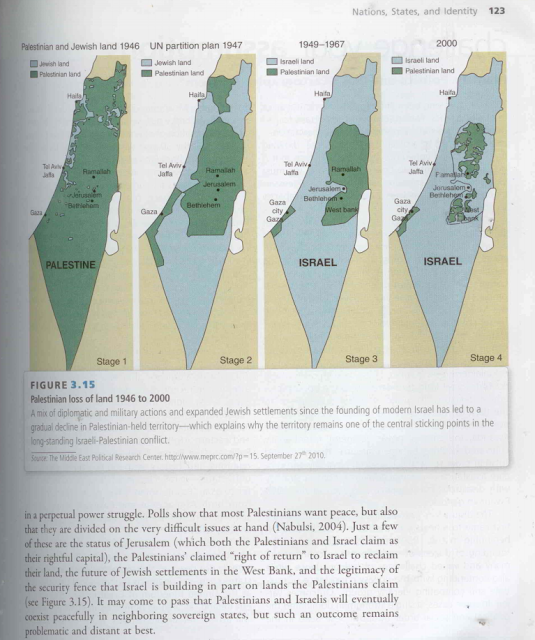Lobby Watch
13 April 2016

An image published by Elder of Ziyon from the textbook Global Politics, as part of the anti-Palestinian blogger’s successful campaign to pressure McGraw Hill over maps depicting land loss in Palestine.
A group of American and international scholars is urging publishing giant McGraw-Hill Education to reverse its recent decision to withdraw and destroy its US college textbook containing a sequence of maps depicting the progressive loss of Palestinian land to Zionist and Israeli colonialism between 1946 and 2000.
In a letter signed by more than 35 prominent academics, including Judith Butler, Ilan Pappe, Avi Shlaim and Noam Chomsky, the scholars state, “This blatant act of censorship, in response to complaints from those who seek to suppress a free exchange of knowledge and ideas about Israel and Palestine, is shocking and unacceptable.”
The letter was drafted by the Jewish Voice for Peace academic advisory council.
Though the political science textbook, titled Global Politics: Engaging a Complex World, was published in 2012, the backlash against it was only instigated last month, when anti-Palestinian blogger Elder of Ziyon directed readers to contact McGraw-Hill with complaints against the maps.
Other right-wing and anti-Palestinian media outlets picked up the story, including The Blaze and The Tower, a production of The Israel Project, a well-funded Israeli propaganda group.
“As soon as we learned about the concerns with it,” Catherine Mathis, a spokesperson for McGraw-Hill Education, told Inside Higher Ed, “we placed sales of the book on hold and immediately initiated an academic review.”
Mathis said the review found the map did not meet their academic standards and that the publisher would cease selling the book and destroy all remaining copies. Mathis also said McGraw-Hill was offering refunds to those who return the book.
The publisher did not respond to The Electronic Intifada’s questions about who had conducted the review and how they reached their conclusion.
The signatories of the letter reject the publisher’s explanation. “If there were in fact any minor errors with the maps they should have been corrected rather than removed altogether.”
“It is essential that faculty and students have access to educational materials that speak to the dispossession Palestinians have experienced and continue to experience today. We cannot have a truly comprehensive understanding of Palestine or Israel without this information.”
Elder of Ziyon, an anonymous blogger, and The Blaze had based their protest on the claim that the maps erroneously referred to the territory between the Mediterranean Sea and the Jordan River as Palestine, while during the time period it was under the control of various occupying powers.
In an email to The Electronic Intifada, Rashid Khalidi, a historian at Columbia University who signed the letter, said, “The absurd critique of these maps is just a reformulation of the persistent denial of Palestinian peoplehood, which was summarized in Golda Meir’s notorious 1969 claim that the Palestinians never existed. The purpose of this effort to delegitimize Palestinian claims is transparently obvious: it is meant to bolster an exclusive Zionist claim to the entirety of Palestine.”
“Israel refuses to draw definitive borders to its territory, leaving open the full annexation of all of historic Palestine,” signatory Katherine Franke, also a professor at Columbia University, wrote in an email to The Electronic Intifada. “Mapping in Israel is a highly politicized project, and tragically US academic publishing has now been drawn into that politics.”
Tags
Source Article from https://electronicintifada.net/blogs/charlotte-silver/reverse-censorship-palestine-maps-scholars-tell-mcgraw-hill
 RSS Feed
RSS Feed















 April 14th, 2016
April 14th, 2016  Awake Goy
Awake Goy 
 Posted in
Posted in  Tags:
Tags: 














Add new comment